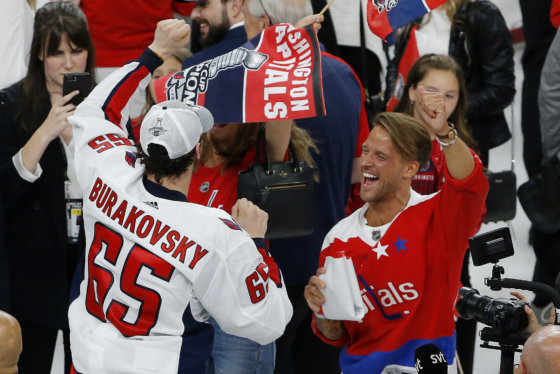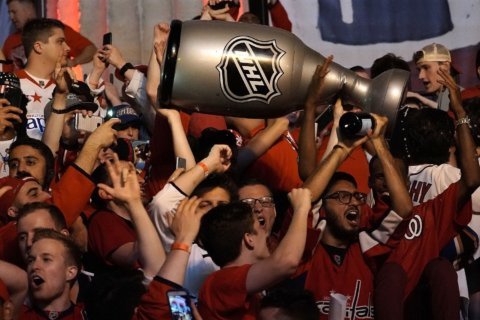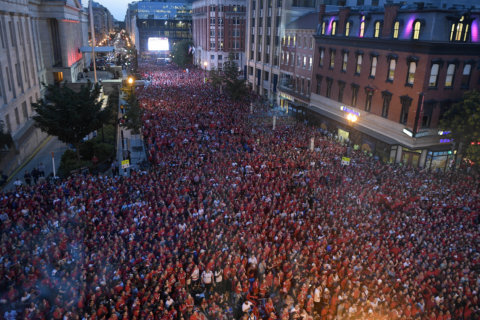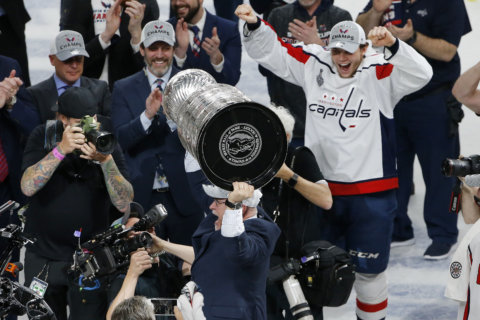WASHINGTON — June 7, 2018. After 44 years, the Washington Capitals are Stanley Cup champions. Some might say, “it’s about time.”
I say it’s about…
A franchise born as a necessity for the Capital Centre, which opened in December of 1973 for the Capital Bullets. The hockey team got its name on Jan. 22, 1974 when owner Abe Pollin revealed that “Capitals” had emerged as a contest winner, beating out Comets, Pandas, Metros and, believe it or not, Eagles.
It’s about staying power stronger than it’s expansion partner, the Kansas City Scouts. After two years, they split for Colorado to become the Rockies and, four years later, left for New Jersey to become the Devils.
It’s about beating the best-ever expansion team to win the Stanley Cup after being the worst ever expansion team during the 1974-75 season, when they went 8-67-5. Of those eight wins, only one came on the road. It was against the California Golden Seals, which would become the last major American sports franchise to fold four years later as the Cleveland Barons. That road win was celebrated by carrying a trash can around the dressing room, on which they had written in magic marker, “Stanley Cup.”
It’s about Ron Weber, the team’s first and longest-serving radio voice. Long before we had statistics at our fingertips on the internet, Ron spent the hours before face off meticulously calculating numbers that came across the AM airwaves on WTOP on cold winter nights.
It’s about Jack Doninger and Warner Wolf as the early TV voices on WTOP TV. Like most of us Washingtonians at the time, Warner wondered, “Hey Jack, what’s the difference between the red line and blue line?”
It’s about the more hockey-educated voices who replaced them on the “Channel you cheer for” — Mike Fornes and Al Koken.
It’s about the Capitals’ first captain, Yvon Labre, who wore No. 7 and came to town in the same year as the city’s most celebrated No. 7, Joe Theismann. But while Joey T quarterbacked two Super Bowl teams, Labre never played on a winning team here. As a tribute to his talent, his number was the first retired by the organization.
It’s about the Capitals’ first draft pick, Greg Joly, whose career was anything but (jolly, that is). After 98 games in a Caps uniform, he was dealt to Detroit for Bryan “Bugsy” Watson, an enforcer who knew his way to the penalty box and wore every fight on his scarred face.
It’s about Ron Low and Bernie Wolfe, who did what they could to keep pucks out of the net in the early days. Bernie’s talents were recognized by the Hall of Fame — the D.C. Jewish Hall of Fame.
It’s about Garnett “Ace” Bailey, whose nickname indicated luck, but had the misfortune of being on the plane that crashed into the Pentagon on 9/11.
It’s about the “Save the Caps” campaign of 1982. What really saved them on the ice was the first trade ever made by general manager David Poile. On Sept. 9 of that year he sent Ryan Walter and Rick Green to Montreal for Rod Langway, Doug Jarvis, Brian Engblom and Craig Laughlin. Langway became the face of the franchise and was the best player until a guy named Ovechkin came along. Laughlin later became the signature voice of the franchise and team went on to make the playoffs 28 of the next 35 years.
It’s about Bobby Carpenter from Beverly, Massachusetts, who became the first American-born player to score 50 goals in a season.
It’s about Dino Ciccarelli, a flashy scorer, who was overshadowed in the Caps’ first run to the Eastern Conference Final by a journeyman named John Druce, as in “Druce on the loose,” scoring goals by parking himself in front of the net.
It’s about men named Murray — Bryan, who started the season as the Caps coach, then lost the job to his brother Terry, who took the torch and that team to the Eastern Final.
It’s about a decade of underachieving and blowing leads and an endless stream of Tony Kornheiser columns that described the Caps as “choking dogs.”
It’s about Jim Carey — the goalie, not the actor. A goalie who fell off the face of the earth as fast as the actor has in recent years.
It’s about Carey’s replacement, Olaf Kolizig — “Olie the goalie,” who stood on his head and led the Capitals to their unexpected first appearance in the Stanley Cup Final 20 years ago.
It’s about George McPhee and Ron Wilson, the first-year duo that built that team and never again made the magic happen here.
It’s about Ted Leonsis, one of the early makers of internet magic, who bought the team at the end of the century looking to make a quick splash like AOL.
It’s about Jaromir Jagr, one of Ted’s early moves to make that splash. Eventually, it was a flush, with Jagr shipped out of town not long after an early playoff exit against Tampa Bay, where he complained that the other team had a goalie.
It’s about Jeff Halpern, the only Capital born in Washington D.C., who carved out a nice career against long odds.
It’s about a slew of coaches who came and went, including former stars Adam Oates and Dale Hunter, before Barry Trotz finally delivered.
But more than anything, of more than 500 players listed alphabetically from Keith Acton to Dainus Zubrus, it’s about the man in the middle of the list, Alex Ovechkin. A year ago he seemed destined to join the, “Yeah but he never won” fraternity of Ted Williams, Ernie Banks, Dan Marino and Charles Barkley.
Now he’s a champion. And in sports, that’s what it’s all about.








